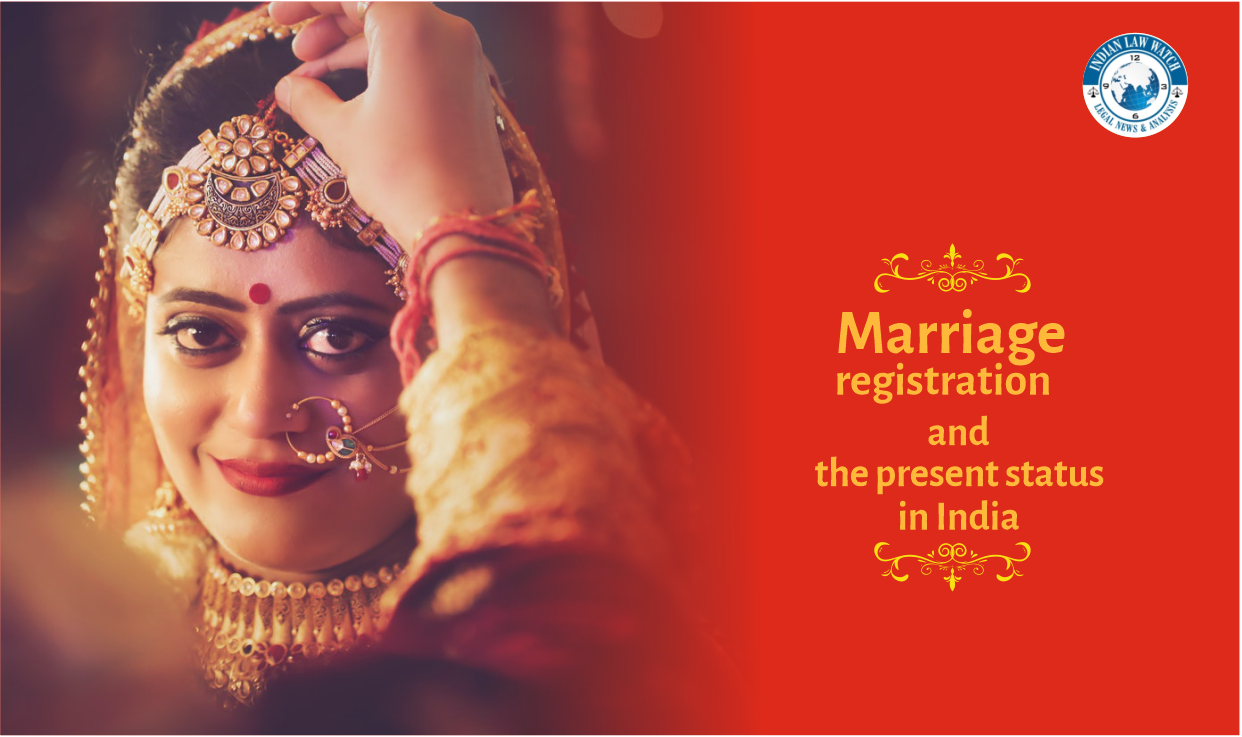
Overview of Global laws in important western jurisdictions where it is common for NRI to marry Indian women for e.g. US, Canada, UK, Middle East, Singapore
The significance of Marriage registration has been recognised by many countries for a variety of reasons, most importantly to protect women in light of events where in absence of concrete proof of marriage Husbands deny maintenance to their wife. Although some countries have provisions for compulsory registration of marriages, they recognise the importance of the same.
In South Africa for instance, the non-registration of marriages does not affect the validity of the marriage. Indeed, a duly signed marriage certificate serves as prima facie proof of the existence of the marriage, however, the existence of the marriage may still be proved by other evidence. This is similar to the position in the United Kingdom and registration as provided under the Australian Marriage Act, 1961.
There are also a few countries where such registration works as a record of events rather than sole evidence of official recognition. Such as in familienbuch in Germany and livret de famille in France. Essentially, such a register has been termed as ‘family album’, ‘household register’ et al in various countries. Japan, although records marriages as a family event, their law does not recognise a marriage until and unless it is registered in Koseki (household register).
Then there are countries such as Pakistan, Bangladesh, Indonesia, and Indonesia that make registration compulsory. In Bangladesh, non-registration is punishable with simple imprisonment which may extend up to two years, or fine up to 3000 Taka, or with both.
Indian Legal Framework on Marriage Registration
Marriages in India are considered a religious activity leading to a holy bond between two individuals. With the diverse nature of the population, it is difficult to set a standard criterion for recognition of marriages. The personal law system in India makes it necessary to accept cultural and religious diversity. For this reason, India, like some other countries, expressed some reservations while ratifying the 1993 Convention on the Elimination of All Forms of Discrimination against Women, which discussed compulsory registration of marriages. The two main acts that govern marriages in India are: The Hindu Marriage Act, 1955 and the Special Marriage Act, 1954. While the former associates marriages with customary and religious ceremony, the latter categorises marriage under the same to be a civil contract by nature.
The introduction of Compulsory Registration of Marriage Bill, 2005 by the National Commission of Women provided for a holistic view on marriage registration keeping in mind different social structures and legislations. In 2008, the Law Commission of India, in the report titled “Proposal to Amend the Prohibition of Child Marriage Act, 2006 and Other Allied Laws” and “Laws on Registration of Marriage and Divorce – A proposal for Consolidation and Reform” recommended a compulsory registration of marriages within a stipulated period, of all the communities, viz. Hindu, Muslim, Christians, etc. In the latter report, the commission proposed an enactment of a “Marriage and Divorce Registration Act” by amending the existing Births and Deaths Registration Act, 1886 and making it applicable to the whole of India and to all citizens. The Bill, however, was never passed by Lok Sabha.
In the case of Seema v. Ashwani Kumar 2006 (2) SCC 578, the Supreme Court observed the importance of compulsory registration of marriage and called upon the states to pass rules or law for the same. Pursuant to this, many states have passed laws or framed rules for compulsory registration of marriages. The most forward approach can be seen in Goa, where the code is based on Portuguese Code of 1867. The act makes registration or permission from concerned authority a prerequisite for customary marriages.
Supreme Court judgment on marriage registration
In various cases, the courts time and again have observed the importance of marriage registration. In Kanagavalli v. Saroja (AIR 2002 Mad 73), the Madras High Court elaborated on the importance of registration in providing security to women. The court noted that registration can make prosecution of bigamy easier as the registration deed can act as a proof of first marriage. A similar conclusion was drawn in the case of Baljit Kaur v. State of Punjab, (2008) 151 PLR 326. In this case, the Punjab and Haryana High Court reiterated the ratio in Seema case and opined that making registration of marriage compulsory would reduce the disputes related to solemnization of marriages.
Similarly, in Sushma W/o Hemant Rao Bodas v. Malti W/o Madhukar Machile (2009 Bom LR 3974), the Bombay High Court supported the existence of a marriage certificate and on that basis ruled in favour of a valid marriage. The court additionally noted that marriage certificates are useful evidence in cases of succession as well.
Documents required for marriage registration
- An application form signed by both the parties.
- A document for birth proof of both the parties.
- Residential proof of both the parties of both the parties.
- If the marriage took place in any religious place, a certificate from the institution, certifying the solemnization of the marriage.
- Rs 100, if the marriage is registered under the Hindu Marriage Act, 1955 and Rs 150, if the marriage is registered under the Special Marriage Act, 1954, to be submitted to the district cashier. The receipt of the payment is to be attached with the application form.
- Two passport size photos of both the parties.
- Separate Marriage Affidavits in prescribed format from Husband & Wife
- The invitation card for the wedding if the marriage is solemnized.
- In case any of the parties is divorced, an attested copy of the divorce decree should be attached with the application form.
- In case any of the party is a widow or a widower, the death certificate of the spouse should be attached with the application form.
Some requirements may vary as per the state laws and rules.
Feasibility of Information Technology enabled registration in India
With the growth of technology, everything is just a click away, even marriage registration. Offline registration of marriages is usually time consuming which is why to encourage registration of marriages, some of the state governments have introduced online marriage registration portals. These portals allow you to register your marriages, from the comfort of your home.
Offenses that arise due to non-registration of marriage and remedy available
In India, as per the current legal regime there are no serious consequences of not registering a marriage. However, the compulsory registration Bill suggested a few penalties for certain offences related to registration. Section 25-28 of the Bill talks about penalties that will be levied in cases. Such as, any person who tampers with or dishonestly or fraudulently alters the register or any part thereof will be punished with imprisonment for a term which may extend to five years and with a fine of ₹ 5000. Further, if any individual wilfully neglects to submit a required memorandum under Section 13, they will be liable to pay a fine of Rs. 500 and if any individual lies on the memorandum, they are punished with an imprisonment for 2 months and fine that may extend to ₹ 5000. Since the bill was never passed, these are not enforceable.





